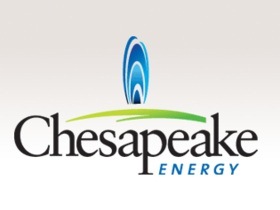
For the full year, Chesapeake reported adjusted EPS of $1.50 on revenues of $17.51 billion, compared with EPS of $0.61 on revenues of $12.32 billion in 2012. Consensus estimates called for EPS of $1.65 on revenues of $17.45 billion.
In the fourth quarter, average daily oil production increased 15% year-over-year and decreased 7% sequentially, average daily NGL production increased 26% year-over-year and 9% sequentially, and natural gas production decreased 3% year-over-year and 1% sequentially. Planned reductions were responsible for most of the decrease, but cold weather also had an impact in October and December. The sequential declines hammered earnings and revenues and will weigh heavily when trading begins.
On a GAAP basis, full-year EPS totaled $0.73 a share. Adjustments included a $341 million impairment charge, a $154 million restructuring charge, a $120 million charge to purchase debt and extinguish a lease obligation, $95 million losses on some investments, a gain of $187 million on sales of some fixed assets and an unrealized non-cash gain of $100 million from Chesapeake’s derivative instruments.
So far in 2014, Chesapeake has received $209 million of net proceeds from an asset sale and expects to receive more than $150 million related to asset sales in 2012 and 2013. Other sales still to be close are expected to generate proceeds of about $650 million during the year. Chesapeake sold off $4.4 billion in assets in 2013.
Chesapeake issued its 2014 outlook on February 6. The company expects total production to increase 2% to 4% over 2013, with a 40% to 45% rise in natural gas liquids production. The company did not offer EPS or revenue guidance, but the consensus estimates call for first-quarter EPS of $0.46 on revenues of $4.75 billion. The full-year estimates are EPS of $1.94 and revenues of $19.65 billion.
Doug Lawler, Chesapeake’s new CEO, said:
2013 was a foundational year in which we focused on optimizing our business processes, implementing a disciplined capital budget, decreasing per unit cash costs, selling noncore assets and reducing liabilities. We believe that the impact of these efforts on our capital efficiency and returns will become even more evident in 2014 as we continue to drive well performance up and well costs and per unit cash costs down. In 2014 we plan to reduce drilling and completion costs, before drilling carry credits, by nearly $900 million, while still generating comparable production growth year over year.
This is not altogether good news for investors. Cutting drilling and completion costs and still generating production growth is a pretty delicate balance. It would not take much to throw that balance out of whack.
Chesapeake shares traded down 0.1% in the premarket, at $26.91 in a 52-week range of $18.21 to $29.06. The consensus target price for the shares was around $27.20 before the report.
Thank you for reading! Have some feedback for us?
Contact the 24/7 Wall St. editorial team.




